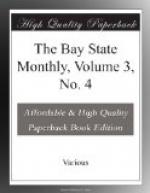“Although we lived in a republic where attainder is unknown in the laws of the land, still my mother felt the disgrace keenly. She never believed implicitly, however, that her grandfather was really guilty of the crime for which he was convicted. In fact, after his sentence had been pronounced, there were strong reasons for believing that he was not in England at all at the time of the treason, and his son never ceased in his unavailing efforts to find his whereabouts.
“The Crabshaw family had always been warm friends of ours, and, although they had brought from England many British ideas and counted much on loyalty, yet they were always ready to appreciate any true worth. After I was left alone I valued their friendship highly. I was always welcome at Mr. Crabshaw’s house. Cecilia and I were companions in study, and almost before I knew it we were—in love. As I found this sentiment strengthening I grew alarmed; for, although no allusion to my family disgrace had ever been made in my presence, I was aware that Mr. Crabshaw knew the history well, and that the thought of an alliance with the house of Crabshaw would be folly. It was at that time that my mother’s belief in her grandfather’s innocence became more strongly impressed upon me, and I formed the purpose, almost hopeless though it seemed, of establishing the truth of this belief. The idea grew upon me. I found myself getting nervous, and for the sake of my health I came here two years ago to find relaxation in trout fishing and the study of nature.”
We had walked during the relation of my friend’s narrative along the road often travelled by me before, and which led to the three shattered elms and the old cellar. We sat down beneath the shade of the trees once more to rest, and as we did so Gault took from his pocket the old knife which two years before had been discovered in the grass-grown cellar.
“There,” said he, holding it before my eyes, “there is the name on the handle that you read for the first time,—’Samuel Wickham,’—and you can imagine my feelings when I tell you that that was the name of my great-grandfather. When you told me that Deacon Thompson had a record of this long past tragedy you doubtless remember the intense eagerness with which I hastened to find him.
“In the diary was distinctly recorded the burning of the house, March 4, 1795. If Samuel Wickham was guilty of the crime it was utterly impossible that he should have been out of England at that time. From that moment my cherished belief became a settled conviction. My means were limited, but I resolved to visit England at once, and, if possible, substantiate the evidence found so unexpectedly under these elms; not that I expected to obtain reversal of a sentence pronounced in a court of law over eighty years ago, but Cecelia Crabshaw should know that my blood was not tainted by an ancestor’s crime. I can assure you that I thought much more than I slept that night.




